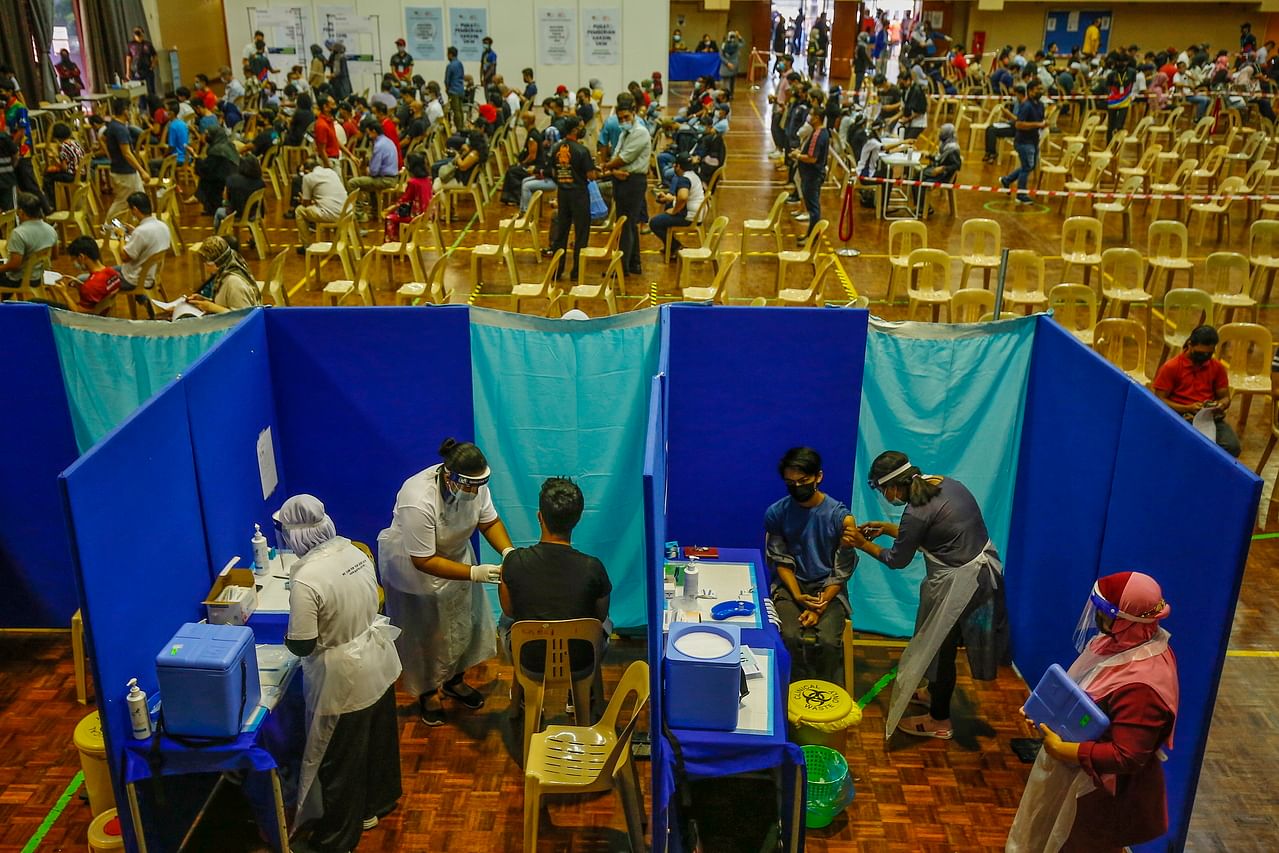Calls for faster Covid-19 vaccine roll-out as Malaysia fights to contain surge
KUALA LUMPUR – Malaysia’s health experts and the opposition have called for a faster Covid-19 vaccine roll-out as cases surge, with questions raised over the supply of vaccines.
The country’s vaccination programme kicked off on Feb 24 but opposition politicians have criticised it as proceeding at a glacial pace.
“To reduce the number of daily confirmed cases of Covid-19, the government must make sure the control and prevention programme of Covid-19 takes place effectively,” said Dr Kamarul Imran Musa, a medical epidemiologist and biostatistician who is an associate professor at Universiti Sains Malaysia.
This includes “maximising vaccine roll-out as soon as possible,” he told The Straits Times.
Almost 10 million people have signed up for the Covid-19 vaccine in Malaysia, with just over 1 million, or 10.6 per cent having received either one or both doses of vaccines.
This means only about 3 per cent of the population have been vaccinated in two and a half months.
“There is still a long way to reach 80 per cent coverage, or herd immunity, for Covid-19,” said Dr Kamarul. That is what Malaysia has targeted to achieve by December.
Opposition Democratic Action Party (DAP) assemblyman Rajiv Rishyakaran has voiced concerns over what appeared to be the delayed distribution of the Sinovac vaccine.
Malaysian pharmaceutical company Pharmaniaga announced in January that it had signed an agreement with the Chinese company Sinovac Biotech to bottle and distribute 14 million doses of the Covid-19 vaccine.
Malaysia received 200 litres of the vaccine on February 27, enough for 300,000 doses.
Another two shipments of 100,000 doses of Sinovac’s vaccine arrived on March 15 and 22, and Coordinating Minister for Immunisation Khairy Jamaluddin received his first dose on March 18.
But Mr Rishyakaran said there had been no news of the first batch of 300,000 doses being used.
“If Pharmaniaga is unable to perform in the bottling and distribution of the final product, Khairy and the government need to address this massive shortcoming urgently,” Mr Rishyakaran wrote on Facebook last month.
“It seems very slow to get the bottling facilities up and running,” told ST.”
DAP secretary general Lim Guan Eng also raised concerns.
“The vaccination rates continue to be… slow and the economic recovery is stalled. At its current pace, analysts estimate that it would take another three years to provide at least one dose to 80 per cent of the population,” he said in a statement on Saturday (May 9).
Mr Khairy said last week that there could be delays to the programme as vaccines were slow to arrive, claiming that pharmaceutical companies were prioritising richer countries.
“People come to me all the time telling me they want the vaccines. It’s not that they are sitting in a freezer here in KL but they have not arrived yet. They arrive on a very gradual basis,” he was quoted as saying by the Malay Mail news website.
“So it’s like a scene from Titanic where the guys from the lower class are waiting for the lifeboats and the guys from the upper cabin have already gone onto them,” he said.
But Health Minister Adham Baba said the roll-out was on track.
“We will receive 3.52 million doses of vaccines from three suppliers this month alone and the amount will increase in the coming months. We are confident that we can actually carry out the vaccination programme faster,” said Dr Adham.
Malaysia is expected to receive the vaccines from Pfizer-BioNtech, Sinovac and AstraZeneca this month.
Dr Adham pointed out that the second phase of the programme, to inoculate senior citizens and those with chronic conditions and disabilities, which was supposed to begin in May, was brought forward to April 19 and will run until August.
But Mr Khairy said the third phase, targeting the general population, may be delayed beyond its scheduled kick-off in May.
With many Malaysians having registered since February yet to get a vaccination appointment, when the ministry offered 268,000 doses of the AstraZeneca vaccine to volunteers, they were snapped up within three hours on May 2.
The government offered the AstraZeneca shot separately from its national Covid-19 immunisation drive after concerns emerged in Europe that it could cause blood clots in very rare instances.
Malaysians flooded social media with posts about attempts to get a dose.
“At one stage I wasn’t sure if I had succeeded in actually securing a slot, or had just been waitlisted,” said home-maker Shirley Liew, 58. “The entire process was like trying to buy tickets for a BTS concert!”
Source: Read Full Article



